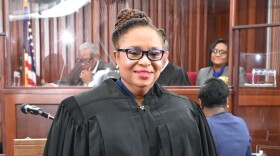ST. CROIX — The Virgin Islands Board of Elections voted during an emergency meeting held in person and virtually Monday to wait for more information before it will decide whether to uphold the disqualification of Ida Smith as a candidate for the office of delegate to Congress.
There was confusion among board members during the meeting when it came to understanding the motions they were voting on. There was also confusion when it came time for the board to enter executive session because no vote was taken, and no reason was given for doing so.
Supervisor of Elections Caroline Fawkes, while participating virtually, told board members that she disqualified Smith as a candidate after a search of her voting record in New York revealed she was an active registered voter up until she canceled her registration in the state on July 24. Fawkes said no U.S. citizen can be registered in two states or territories at the same time, noting all disqualification letters were shared with the board on June 26.
Smith, who also participated in the meeting virtually, said she submitted proof to Fawkes that she was not registered to vote in New York. She said it would be an “injustice” if her name was not included on the ballot during the general election as a candidate for delegate to Congress.
The Board of Elections held the emergency meeting to discuss Smith’s disqualification after receiving a letter via email from Smith on August 19 asking that her disqualification be vacated, and that the cancellation of her voter’s registration be reinstated. In her letter, Smith noted that Fawkes indicated to her in writing that the reason for her disqualification was based on residency. She suggested Fawkes used the media to say the disqualification was based on dual voter’s registration.
After hearing Smith’s letter read into the record as well as hearing statements from both Fawkes and Smith, the board members had an opportunity to ask each of them questions.
During the question-and-answer segment, Fawkes revealed that an anonymous caller made the initial complaint against Smith relating to residency requirements. Fawkes clarified in response to a question from board member Atanya Springette that the reason she disqualified Smith was because she was registered to vote in New York.
Board member Raymond Williams said he would have liked an opportunity to ask questions of the two deputy elections supervisors — Terrell Alexandre and Kevermay Douglas. He said, however, it would be OK to move forward if the board felt it had sufficient information.
“I don’t know that today we have all the answers,” Williams said. “I think we need to at least drill down.”
After each board member had a chance to ask questions, board chair Alecia Wells said the board would go into executive session. Mary Moorhead, a citizen who attended the meeting, informed the board members that they must state a reason for executive session.
“This is not an executive session issue,” Moorhead said. “I want the reason to be stated before anybody makes motions.”
No reason was placed on the record, and no board member moved any motion to enter executive session. After being asked to leave the conference room by board assistant Richard Wilson, Moorhead refused to leave until hearing the reason for executive session. Board member Michael Joseph said Moorhead was out of order, but board member Lisa Harris-Moorhead defended her.
“The law states that we have to state the reasons that we’re going into executive session,” Harris-Moorhead said. “It’s either personnel or legal matters.”

Wells said the board was going into executive session to discuss the concern raised by Williams that the members did not have an opportunity to question Alexandre or Douglas. Moorhead pointed out no such motion was placed on the record.
“The motion was not clearly stated,” Moorhead said. “I didn’t hear any motion.”
Wells then called for board secretary Lydia Hendricks to take the roll call on the motion to enter executive session, even though no board member made such a motion.
“This is crazy,” Harris-Moorhead, who abstained from voting on the motion, said.
After executive session, Wells reported out that the board discussed whether to uphold Smith’s disqualification, noting that no votes were taken. She then requested a motion.
Joseph moved to adopt Fawkes’ findings of disqualification. Kareem Francis gave the motion a second. Epiphane Joseph objected.
“I object to the motion because there are a couple of questions that were not answered, and there are a couple of dates that are confusing,” Epiphane Joseph said, adding that he heard two different dates relative to when Smith canceled her voter registration that caused confusion. “In light of that, I don’t think we should accept Miss Fawkes’ finding.”

Lilliana Belardo de O’Neal then moved to amend the motion offered by Michael Joseph to have the board hold off on voting until its next meeting so the members “can get this confusion clear with information from anyone that we need.” Harriet Mercer and Atanya Springette gave her motion a second. The motion passed 6 to 5, with three members absent. It was approved by Mercer, Belardo de O’Neal, Springette, Williams, Epiphane Joseph, and St. John Administrator Shikima Jones-Sprauve. It was opposed by Francis, Hendricks, Wells, Angeli Leerdam, and Florine Audain-Hassell. Harris-Moorhead and Michael Joseph were absent during roll call, while Arturo Watlington Jr. was absent from the meeting.
Wells then announced that the original motion was to adopt Fawkes’ disqualification of Smith, but the amended motion was to hold off on voting on the matter until additional information is gathered. She called for a roll call on the motion as amended. Mercer voted against the motion.
“They want us to vote to adopt disqualification after we get more information,” Mercer said. “I say no.”
Springette voted yes, while Belardo de O’Neal voted no.
Belardo de O’Neal originally moved the amendment, which received a second by Mercer and Springette.
Williams spoke out during roll call.
“I think this meeting is really going bad,” he said. “People are not listening and people who are voting are not sure what they’re voting on.”
Wells clarified the motion as amended was to wait for further information before voting on whether to uphold Smith’s disqualification. She asked Hendricks to start roll call over. Hassell asked for clarification on the motion, questioning if it was for the board to obtain information before deciding.
Williams attempted to explain the motion as amended while another board member asked for the motion to be repeated one more time. Belardo de O’Neal had enough at that point.
“Oh no,” Belardo de O’Neal said. “I’m leaving.”

A board member then asked if the vote was for approval. Wells explained the motion again.
“No decision will be made until further information is gotten,” she said.
Hassell said her vote would be “yes” if the motion was to hold any decision until further information is provided. Wells asked Hendricks to start roll call over. The motion as amended passed by a vote of 6 to 5, with three members absent. It was approved by Hassell, Hendricks, Sprauve, Springette, Williams, and Epiphane Joseph. It was opposed by Francis, Leerdam, Wells, Mercer, and Michael Joseph. Harris-Moorhead and Belardo de O’Neal were absent during roll call, while Watlington was absent from the meeting.
Wells then explained the motion the board approved.
“OK, so the will of the board is that we’re going to wait until we get some more information before we adopt Mrs. Fawkes’ disqualification of Ida Smith,” she said.
Epiphane Joseph moved to adjourn, but Williams objected. Williams said he objected because he was going to make a motion to set a date to dispose of Smith’s request. Wells said the board was scheduled to meet Wednesday to go over ballots, suggesting addressing Smith’s disqualification at that time. She said Wilson, the board’s administrative assistant, would issue a news release.















